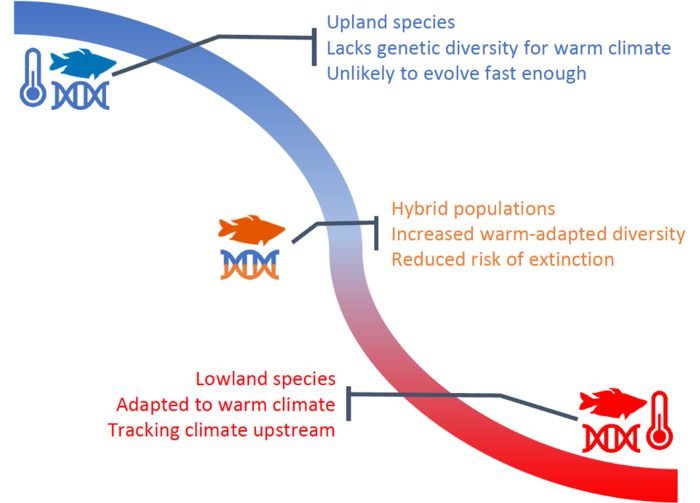Genetic diversity is the raw material that enables populations to evolve in response to changes in the environment – essentially, the more diversity the better.

Credit: CreditL Figure 1. Genetic mixing between warm-adapted and cool-adapted species can reduce the risk of extinction due to climate change. Chris Brauer at Flinders University
Genetic diversity is the raw material that enables populations to evolve in response to changes in the environment – essentially, the more diversity the better.
Rapid climate warming is challenging many species to evolve and adapt quickly enough to avoid extinction, particularly species that don’t tolerate much environmental variation, such as those from cooler high-elevation habitats, which may lack genetic diversity important for adapting to climate change.
Hybridization, the process of mixing different species, can potentially help the vulnerable adopt and rapidly exploit novel genetic diversity from species that might already be adapted to warmer environments. However, hybrid populations have traditionally been considered of little conservation value.
New research, published in the prestigious journal Nature Climate Change provides rare evidence that natural hybridization can reduce the risk of extinction of species threatened by climate change.
This concept is similar to how the historic mixing between our ancestors and Neanderthals led to improved fitness in some modern human populations.
The team, including lead-author Dr Chris Brauer, project coordinator Professor Luciano Beheregaray and other biologists travelled to the Wet Tropics region of northeastern Australia to collect samples of five species of tropical rainbowfish along an elevational gradient.
They produced genomic data from the samples and discovered several pure and hybrid populations of rainbowfish. They also identified genes that enable rainbowfish populations to adapt to climate variation across the region and used environmental models to work out how much evolution will likely be required for populations to keep pace with climate change in the future.
Dr Brauer says that populations of cool-adapted upland species that have hybridised with a warm-adapted lowland species showed reduced vulnerability to future climates.
“These mixed populations contain more diversity at genes we think are important for climate adaptation, and are therefore more likely to persist in warmer environments”.
The finding that hybridisation (genetic mixing) may facilitate rapid adaptation to climate change has important implications for many threatened species.
MELFU Director and Flinders University Professor Luciano Beheregaray says that this study highlights the underappreciated conservation value of hybrid populations.
“Our findings are good news for biodiversity. They indicate that genetic mixing is an important tool for conservation that can contribute to natural evolutionary rescue of species threatened by climate change.”
Journal
Nature Climate Change
DOI
10.1038/s41558-022-01585-1
Method of Research
Case study
Subject of Research
Animals
Article Title
Natural hybridization reduces vulnerability to climate change’
Article Publication Date
30-Jan-2023




